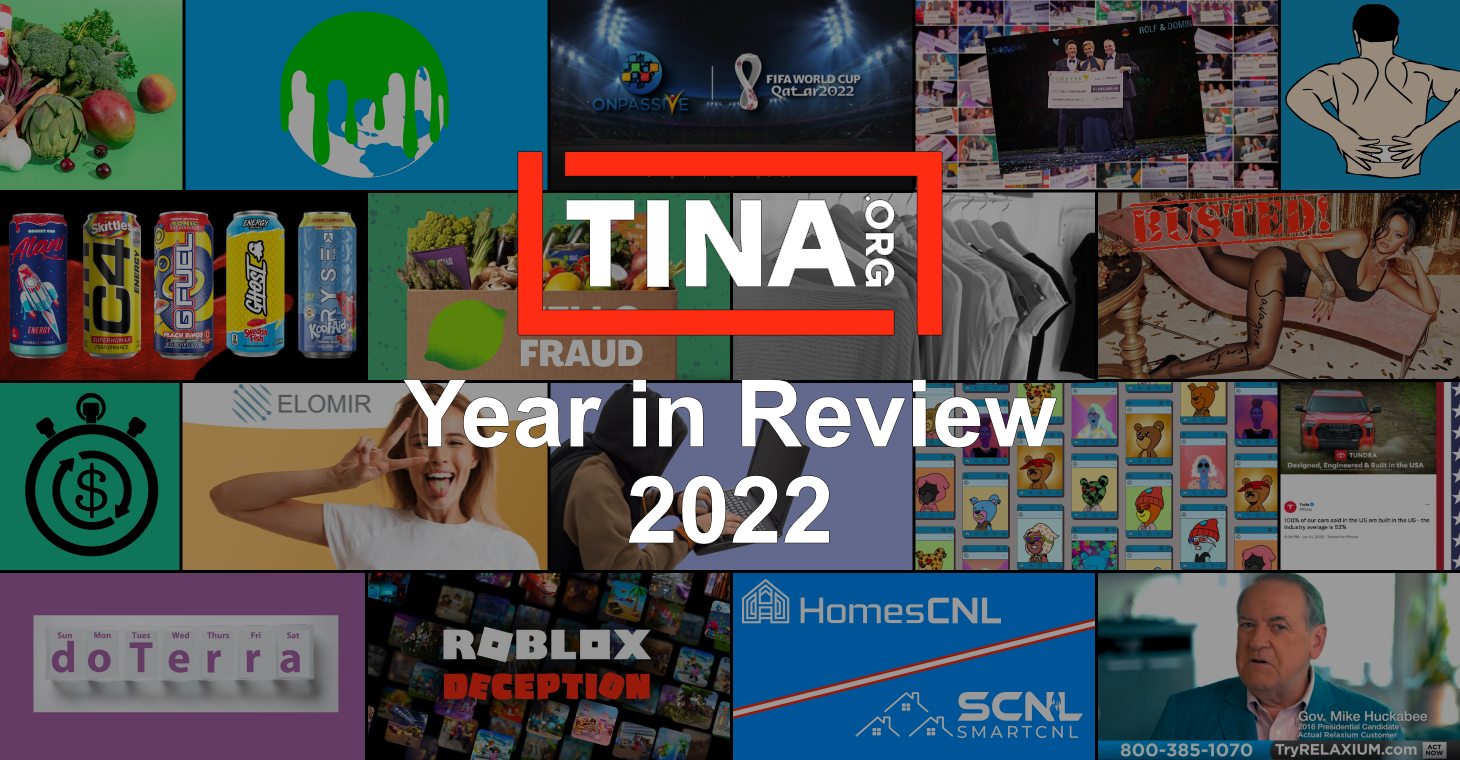
Week in Review
Oil, heating pads, rugs, razors, and drinks – no, this isn’t about preparing for a romantic interlude, but rather the products featured in the I-think-you’re-lying-to-me category during the week of…
Here's what we accomplished in 2022 with your help.
| Bonnie Patten
It was a busy year for TINA.org. In February, we launched TINA.org 2.0 with a new website and logo design. The new website focuses on amassing all the information we have uncovered and collected over the years on specific brands (and their parent companies) in one place so that patterns of deception can be readily detected and recidivists easily identified. And with our new site’s enhanced tools and search capabilities, consumers can more easily learn about common deceptive advertising techniques, consumer protection laws and alerts about specific deceptive marketing campaigns. In addition, we actively pursued a multitude of brands, companies and influencers that engaged in false and deceptive marketing. Below is a summary of some of our accomplishments in 2022. (Click each title to see more.)
TINA.org pursued more than 25 legal actions targeting more than 100 companies. These actions included complaints to federal, state, self-regulatory and/or international agencies; letters to companies; comments to federal regulators; and a state Supreme Court amici curiae brief.
TINA.org filed complaints this year with federal, state and/or international agencies concerning deceptive advertising by a gaming platform with more than 50 million daily users; the largest meal kit provider in the United States; an energy drink company doing business with candy giant Mondelez International and beverage behemoth Anheuser-Busch InBev (in conjunction with the UConn Rudd Center); the publisher of one of the most popular sports video games of all time (along with a coalition of other U.S. consumer groups); and two multilevel marketing companies. TINA.org also notified the FDA of a dental cosmetics company improperly using the FDA logo and falsely claiming its products were FDA approved, and filed three complaints with the Direct Selling Self-Regulatory Council (DSSRC) regarding multilevel marketing companies using atypical income claims and unsubstantiated health claims.
Further, TINA.org sent letters to two imposter scam websites deceptively disguising themselves as an official government site and another one to DJ Khaled, who needed reminding about the legal requirement to disclose his connections to the alcohol brands he promotes on social media.
In addition, TINA.org filed an amici curiae brief in Washington State Supreme Court (together with a First Amendment expert and a consumer justice organization) supporting the state’s action against a for-profit thrift retail corporation misleadingly advertising itself as a charity.
TINA.org also filed five comments with the FTC this year regarding whether the agency should propose a rulemaking to address deceptive earnings claims, ways the commission should update its .com Disclosures guidance, proposed changes to the agency’s Endorsement Guides, ways the FTC can protect kids from stealth advertising in digital media, and the commission’s proposed impersonation scams rule.
Here’s a roundup of TINA.org’s 2022 legal actions and our impressive results:
TINA.org pursued a new tactic this year to combat deceptive advertising more broadly in our economy – Consumer Alerts. This year, TINA.org published three Consumer Alerts to sound the alarm concerning widespread deceptive marketing issues, which included energy drinks being unfairly and deceptively marketed to children, misleading promotions of cars as Made in USA and improperly disclosed celebrity promotions of NFTs.
In conjunction with the Consumer Alerts, TINA.org also sent letters to more than 40 energy drink companies notifying them of deceptive advertising tactics prevalent in the industry and urging them to review their marketing to ensure that it complied with the law and industry standards. We also contacted more than a dozen celebrities promoting NFTs (non-fungible tokens) on their social media accounts reminding them of their legal obligations as it pertains to such promotions. And we wrote to more than half a dozen car companies notifying them of deceptive Made in USA marketing issues that they needed to address.
The year’s top ad alerts based on page views ran the gamut from a meal kit delivery service deceptively advertising “free” meals (which we continued to track throughout the year as consumers complained), to an MLM that has been stringing along distributors for years saying it will launch soon (which we wrote about twice), to a popular brand of orange juice that went from “not from concentrate” to “from concentrate” with little warning to consumers.
This year’s top consumer news and blog posts based on page views highlights coverage of TINA.org’s 2022 legal actions against HelloFresh, Roblox and several MLMs including Forever Living, in addition to a blog that would end up being cited in a lawsuit against the marketers of a sleep aid endorsed by Mike Huckabee.
We tracked more than 600 federal class-action lawsuits filed in 2022 alleging false advertising and/or deceptive marketing. TINA.org’s CATrends feature highlighted new class-action trends involving purported “non-drowsy” cold and flu medicines, prenatal tests, pain relief patches, money transfer apps and buy now, pay later services.
Also trending in 2022 were complaints alleging that:
The news media covered TINA.org’s work extensively in 2022, particularly our review of celebrities endorsing NFTs, as well as our investigation into deceptive marketing in the Roblox metaverse. Publications that sought out TINA.org’s expertise on a variety of advertising issues included the New York Times, the Wall Street Journal, Wired, National Public Radio, NBC News and the Los Angeles Times.
TINA.org’s speaking engagements went international this year with presentations to both the World Federation of Advertisers and the International Council for Ad Self-Regulation, as well as giving the keynote at the MLM Consumer Protection conference held in June, which was based on my law review article, Self-Regulation in the Direct Selling Industry: Can it Ever Be More Than Symbolic? TINA.org was also on a DSSRC panel in July, and participated in the FTC’s October workshop on protecting kids from stealth advertising in digital media.
On the education front, we had the opportunity to present our work to a high school consumer behavior class in the Perry school district in Indiana to help the class in creating a public service announcement for their peers on how to be smarter consumers.
With tens of thousands of followers on our social media accounts, TINA.org actively took part in the dissemination and discussion of truth in advertising issues on Twitter, Facebook and Instagram in 2022. Through hundreds of posts, we shared breaking news, developments in the regulatory space, and of course our work on everything from doTerra distributors deceptively promoting products for COVID-19, car wrap scams, our Savage X Fenty success story, additions to our Wall of Shame, and our FTC complaint against Roblox, among other things.
We also used the reach of social media and Google ads to promote awareness of DJ Khaled’s undisclosed alcohol ads, our FTC complaint against Hello Fresh and the rise in greenwashing claims.
As it says in our mission statement, “We recognize and appreciate that advertising serves an important role in our society – to introduce new products and services, to highlight competitive advantages and to enhance brand engagement.” As such, each week TINA.org staff select an ad they like. One of my favorites for 2022 was this one.
For your steadfast financial support, tips, engagement on social media, and expertise and collaboration with us, we are extremely grateful. Thank you! We look forward to working with you in 2023 toward keeping ads honest.
Oil, heating pads, rugs, razors, and drinks – no, this isn’t about preparing for a romantic interlude, but rather the products featured in the I-think-you’re-lying-to-me category during the week of…
During the week of February 4, 2013, digestion, food, and make-up bubbled to the top of the legal I-think-you’re-lying-to-me landscape. Three new false advertising class actions were filed: Maybelline was…
First reaction: totally gross. Second reaction: hello Photoshop!

